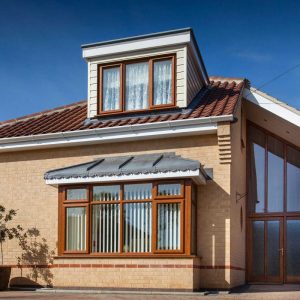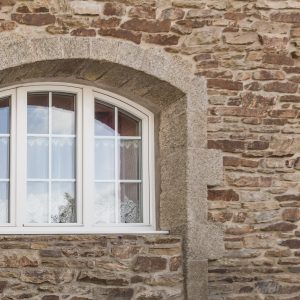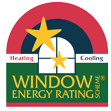Windows are a defining feature of homes, giving houses personality and natural lighting to bring them to life. They also give us a barrier between our homes and the outside world, helping us regulate the temperature and keep things comfortable.
But many windows aren’t efficient, leaking hot air into the house and letting cool air out. This increases energy costs and makes your home less pleasant. It may also lead to more problems down the line. At Ecovue, we're passionate about keeping our windows at their best, so in this article, we’ll go over inspecting your windows for problems and how to check their energy efficiency.
Energy Efficiency of Windows: Checking the Components of Your Windows
In order to check the energy efficiency of your windows, you need to inspect the components and ensure they haven’t deteriorated.
Some windows will have an energy rating called a “U value” that is given by the manufacturer. A low U value means better energy efficiency, so check your window warranty or model to find out its U rating.
Frames
The first step is to inspect the frame and see what type of material it is. There are three main types of window frames: aluminium, wood, and vinyl. Each has its own energy efficiency and expected lifetime, so it's important to know what type of windows you have.
Aluminium
Aluminium frame windows are easy to identify based on their appearance and feel. They will be painted to cover the metal frame and have a different texture than wood. Aluminium frames are generally cheaper and more durable than other windows but are not as energy efficient.
This is because aluminium conducts heat and will warm up quickly on a hot day. When aluminium frames heat up, they can warp or bow due to the weight of the glass window, which creates gaps and passes even more heat into your home.
Wood
Wood frame windows are usually thicker than aluminium windows and heavier than vinyl ones, with a painted and wood-grain textured surface. Many people like the appearance of wood because it offers a more classic look with thicker frames.
Wood windows are the most expensive type because the wood must be cut and shaped perfectly to fit the opening, which is an expensive process. They are more energy efficient than aluminium windows but are more likely to warp and bow due to wood’s sensitivity to humidity.
If you live on the coast, wood windows are not a good choice because the increased water vapour in the air will cause them to rot. Wood windows also require more maintenance and therefore are more expensive.
Vinyl
Vinyl windows are made out of a coloured plastic polymer so will appear smooth and have a hard plastic feel. Vinyl frame windows are the most energy-efficient material because they don’t conduct heat well and are resistant to elements such as humidity.
Vinyl windows are tough and less likely to warp and bow like other window frames. They can still warp and bow over time if exposed to extreme heat, but vinyl windows with metal reinforcement will not bend or warp like other vinyl windows.
Frames and Energy Efficiency
You can do a couple of tests to check if your frames are energy efficient. First, look at the area where the frame meets the sash.
If you can see daylight through any spaces or gaps between the frame and the sash, then your window frame is warped. This means that air is coming through those gaps and the energy efficiency has been compromised. You can also check the lock on your window. If the lock doesn’t line up or doesn’t latch, it can be a sign that your frame is warped.
Make sure to look for any rusting, rotting, or cracking in your window frames. Any kind of deterioration of the frame is a sign that there is something wrong on the inside and that the window is no longer energy efficient.
Window Glass
Figuring out what type of glass you have in your windows is important in finding out how energy efficient they are. The type of glass you have and the number of panes affects the energy efficiency of your window.
Glass Coating
Some windows have a “low e” coating, which is a reflective coating that directs energy from the sun away from the inside of your house. This doesn’t affect the view out of your windows, as the coating is nearly invisible.
If your windows have a slight tint to them or the window frame has lettering that says, “low e”, then your windows have a reflective coating and are more energy efficient than non-coated windows.
Single Pane Versus Double Pane
Windows are almost always either single or double-glazed. Single pane glass is less energy efficient than double because it does not absorb as much solar radiation as two layers of glass.
You can identify single pane windows by holding a flame or light in front of the glass; if you see two reflections, you have double pane glass, whereas if you see one reflection, you have single pane glass.
Glass and Energy Efficiency
To test the energy efficiency of your glass, there is a simple test you can do. During a sunny part of the day, open the window and let your hand sit in the sun for a few minutes. After your hand has felt the temperature and warmed up, shut the window and hold your hand in the sunlight that is coming through the window.
If you don’t feel a significant drop in temperature and intensity of the heat, then your windows aren’t energy efficient. Another quick test is to check for any condensation or water stains on the inside of your windows; if you spot any, it means the seals on the inside of the window have failed and are no longer energy efficient.
Stay Cool
As you can see, there are plenty of ways to lose the energy efficiency of windows in your home and make your energy bill skyrocket. The best way to ensure your home and windows are energy efficient is to inspect them regularly and replace them with more energy-efficient products.
If you have any questions about how to keep your home cool this summer or about energy-efficient windows, why not contact us today? Our experts are always happy to help.













